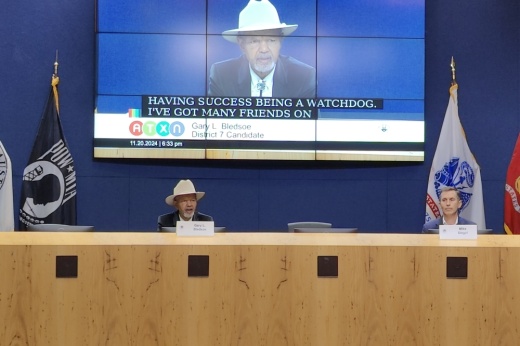The big picture
Bledsoe and Siegel were District 7's two top finishers in the November general election, but as neither secured a majority vote they now head to a runoff contest Dec. 14.
Early voting in select locations will run from Dec. 2-10, and anyone eligible to vote by mail can request a mail ballot through Dec. 3.
Siegel finished just below 40% in the six-way general election race and Bledsoe ended up over 19%. The pair had outpaced their competition with the highest donation levels and spending totals in the North Austin council race this year.
Ahead of the runoff, the city Ethics Review Commission and League of Women Voters Austin Area sponsored the candidate forum at City Hall. The event can be viewed on ATXN and YouTube.
Read Community Impact Q&As with all District 7 candidates, including the two runoff finalists, here.
The big picture
Bledsoe says he's running for a seat on the council dais to provide oversight on City Council with what he called common-sense solutions and a push for greater transparency and public engagement. He also stressed his collaborative track record as a "bridge person" between different factions in the community.
“I’ve spent a lifetime working with people with divergent interests and bringing them together. That is one of the most essential things I bring to the table," he said.
Siegel, also a former educator and lawyer in the city attorney's office, said council needs a strong advocate on climate, reproductive choice, working-class housing and transit. He also said his political and legal experience is important for Austin to counter conservative policymakers in the state Capitol and at the federal level.
“I think we need a city council that’s ready to stand up and protect our community and fight for our community, to actively organize among all sectors, bring people together, develop solutions and be effective," he said.
Public safety
Both candidates shared opinions on the recent approval of a new police contract and significant public attention on issues related to oversight of the Austin Police Department.
Siegel, who worked with the criminal justice reform group Equity Action that promoted the Austin Police Oversight Act ballot measure last year, said he hopes the new labor agreement and a recent legal ruling will allow that policy to be fully rolled.
Bledsoe said it's important for Austin to have that contract in place, and that police accountability will be "as effective as what we can actually make it." He also said he has a more balanced outlook on policing and oversight issues given his experiences with both racial profiling and negotiations with the police.
Bledsoe also said he's like to see mental health calls diverted from APD, while staffing up the department to handle emergencies as needed given lagging 911 response times.
Siegel agreed, saying city officials and police leaders should drill into response time issues and better prioritize officers' daily work to make sure they're handling the community's top needs. He also said addressing homelessness, especially through housing and social service investments, will be key for improving perceptions of public safety.
Development
The candidates shared differing perspectives on the city's approach to land-use issues, like the controversial "HOME" policy allowing for more housing in residential areas.
Bledsoe said Austin must respect private property rights in a way that fits best for all stakeholders, with more attention paid to neighborhood voices, and that there should be opportunity to reconsider recent city policy decisions.
“I’m for balanced development. I’m for development where the actual community, the neighborhood has a say so; that you just don’t do things that disregard people and their communities in terms of the actual development that takes place," he said.
Siegel said he aims to strike a balance between preserving classic neighborhood features while making room for workers and others seeking to affordably live in Austin, while limiting sprawl and reliance on car culture.
“The best case scenario is that we can accommodate the growth and find middle pathways," he said.
Power and water
Both candidates agreed that Austin Energy should exit its share of the Fayette Coal Plant, a longtime goal of city and utility leaders that has yet to be achieved. AE can't unilaterally make that move without negotiations with other stakeholders like the Lower Colorado River Authority, but both Siegel and Bledsoe said Fayette's shutdown is a necessary move for environmental and public health.
On water issues, Bledsoe said Austin's supply management should receive a low grade in part due to "low-hanging fruit" and that the city's water plans should be audited. He pointed to leaking pipe infrastructure that has yet to be repaired as one example, especially given city conservation goals and the low levels of the Highland Lakes that provide Austin's drinking water.
Siegel credited Austin Water staff, despite recent breakdowns like the 2022 boil-water notice incident. He also said he stands behind the city's "visionary" Water Forward long-range plan, although he hopes to see more strides on its implementation and council oversight.





